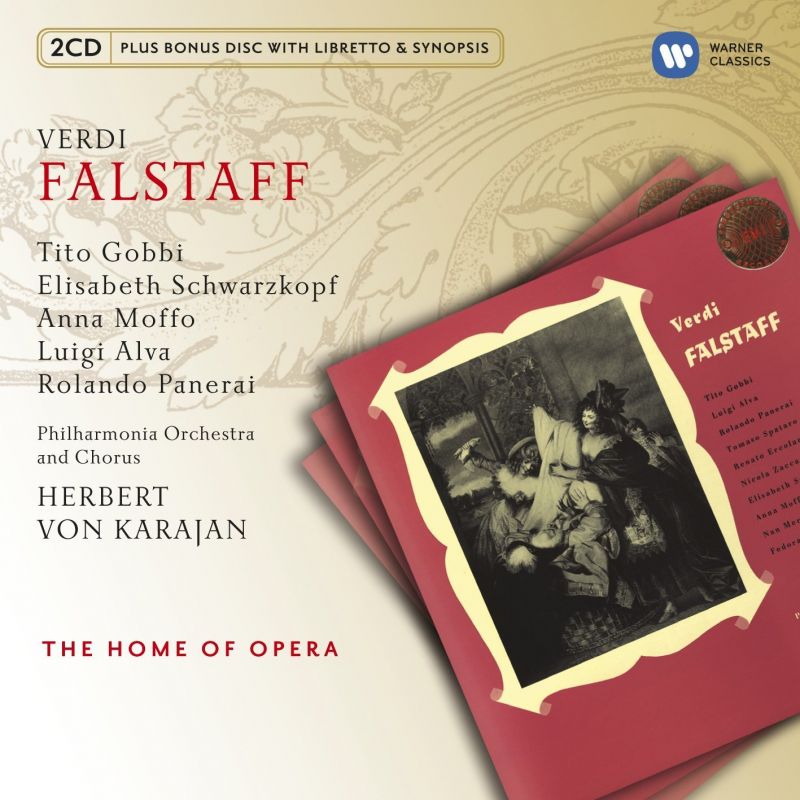Verdi Falstaff
View record and artist detailsRecord and Artist Details
Composer or Director: Giuseppe Verdi
Genre:
Opera
Label: Great Recordings of the Century
Magazine Review Date: 10/1999
Media Format: CD or Download
Media Runtime: 120
Mastering:
ADD
Catalogue Number: 567083-2

Tracks:
| Composition | Artist Credit |
|---|---|
| Falstaff |
Giuseppe Verdi, Composer
Anna Moffo, Nannetta, Soprano Chorus Elisabeth Schwarzkopf, Alice Ford, Soprano Fedora Barbieri, Mistress Quickly, Mezzo soprano Giuseppe Verdi, Composer Herbert von Karajan, Conductor Luigi Alva, Fenton, Tenor Nan Merriman, Meg Page, Mezzo soprano Nicola Zaccaria, Pistol, Bass Philharmonia Orchestra Renato Ercolani, Bardolph, Tenor Rolando Panerai, Ford, Baritone Tito Gobbi, Falstaff, Baritone Tomaso Spataro, Doctor Caius, Tenor |
Author:
After one has grown up with a much-loved recording, no other ever seems to match it. That is the case for me with this Falstaff: none of the recordings that have come along subsequently – 15 are listed on the current
Gramophone Database, not including videos – has come close to what Karajan and his hand-picked cast achieved in Kingsway Hall, London, in June 1956. It will surely prove difficult to surpass its particular combination of virtues.
What are they? Foremost was EMI’s ability in the 1950s to bring together a cast of big personalities and weld them into a true ensemble. As Falstaff is the ensemble opera par excellence, it is no surprise that the policy should have been such a success here. Maybe Elisabeth Schwarzkopf tries to score points too often as Alice Ford, but Nan Merriman is a fine Meg and Fedora Barbieri, though working her fruity chest-notes a touch coarsely, does not miss a trick as Mistress Quickly. In Ford’s big scena Rolando Panerai fails to tune in to the comic melodrama, but he sings well and earns bonus points for taking the great closing phrase in a single arc. A glimpse of perfection is provided by each fleeting appearance of the two young lovers, Luigi Alva light as thistledown in his solo and Anna Moffo touching upon moon-lit top notes as the Queen of the Fairies. As the post-war owner of the title-role, Tito Gobbi is a completely authoritative Falstaff, who wisely leaves others to point the finger at the character’s buffoonery, and he always sings the notes, which he didn’t at his last appearances in the role at Covent Garden.
On all sides, not least the playing of the Philharmonia Orchestra, Karajan presides over the highest technical standards. Of course, the real Verdi lies elsewhere, with the fiery Toscanini for one, but the cultivated air that Karajan brings to Verdi never sounded better than in this Falstaff. What other conductor conjures such magic in the simple chords that accompany the 12 strokes of midnight under Herne’s Oak? Thanks to EMI’s remastering, the sound has more body and depth, and the hiss that was prevalent on previous CD reissues has been reduced: the assignation in Windsor Forest no longer seems to happen during a hailstorm. How appropriate that this evergreen performance should sound younger with each reappearance.'What are they? Foremost was EMI’s ability in the 1950s to bring together a cast of big personalities and weld them into a true ensemble. As Falstaff is the ensemble opera par excellence, it is no surprise that the policy should have been such a success here. Maybe Elisabeth Schwarzkopf tries to score points too often as Alice Ford, but Nan Merriman is a fine Meg and Fedora Barbieri, though working her fruity chest-notes a touch coarsely, does not miss a trick as Mistress Quickly. In Ford’s big scena Rolando Panerai fails to tune in to the comic melodrama, but he sings well and earns bonus points for taking the great closing phrase in a single arc. A glimpse of perfection is provided by each fleeting appearance of the two young lovers, Luigi Alva light as thistledown in his solo and Anna Moffo touching upon moon-lit top notes as the Queen of the Fairies. As the post-war owner of the title-role, Tito Gobbi is a completely authoritative Falstaff, who wisely leaves others to point the finger at the character’s buffoonery, and he always sings the notes, which he didn’t at his last appearances in the role at Covent Garden.
On all sides, not least the playing of the Philharmonia Orchestra, Karajan presides over the highest technical standards. Of course, the real Verdi lies elsewhere, with the fiery Toscanini for one, but the cultivated air that Karajan brings to Verdi never sounded better than in this Falstaff. What other conductor conjures such magic in the simple chords that accompany the 12 strokes of midnight under Herne’s Oak? Thanks to EMI’s remastering, the sound has more body and depth, and the hiss that was prevalent on previous CD reissues has been reduced: the assignation in Windsor Forest no longer seems to happen during a hailstorm. How appropriate that this evergreen performance should sound younger with each reappearance.'
Discover the world's largest classical music catalogue with Presto Music.

Gramophone Digital Club
- Digital Edition
- Digital Archive
- Reviews Database
- Full website access
From £8.75 / month
Subscribe
Gramophone Full Club
- Print Edition
- Digital Edition
- Digital Archive
- Reviews Database
- Full website access
From £11.00 / month
Subscribe
If you are a library, university or other organisation that would be interested in an institutional subscription to Gramophone please click here for further information.




